
11/25/2012 Company Law I Lecture 7: Division of Corporate Powers Company is an artificial person Only acts through intermediary of humans natural persons 2 organs of the company: Board of Directors Members in General Meeting [how about management?] 1
11/25/2012 1 1 Company Law I Lecture 7: Division of Corporate Powers 2 Company is an artificial person • Only acts through intermediary of humans natural persons • 2 organs of the company: - Board of Directors - Members in General Meeting - [how about management?]
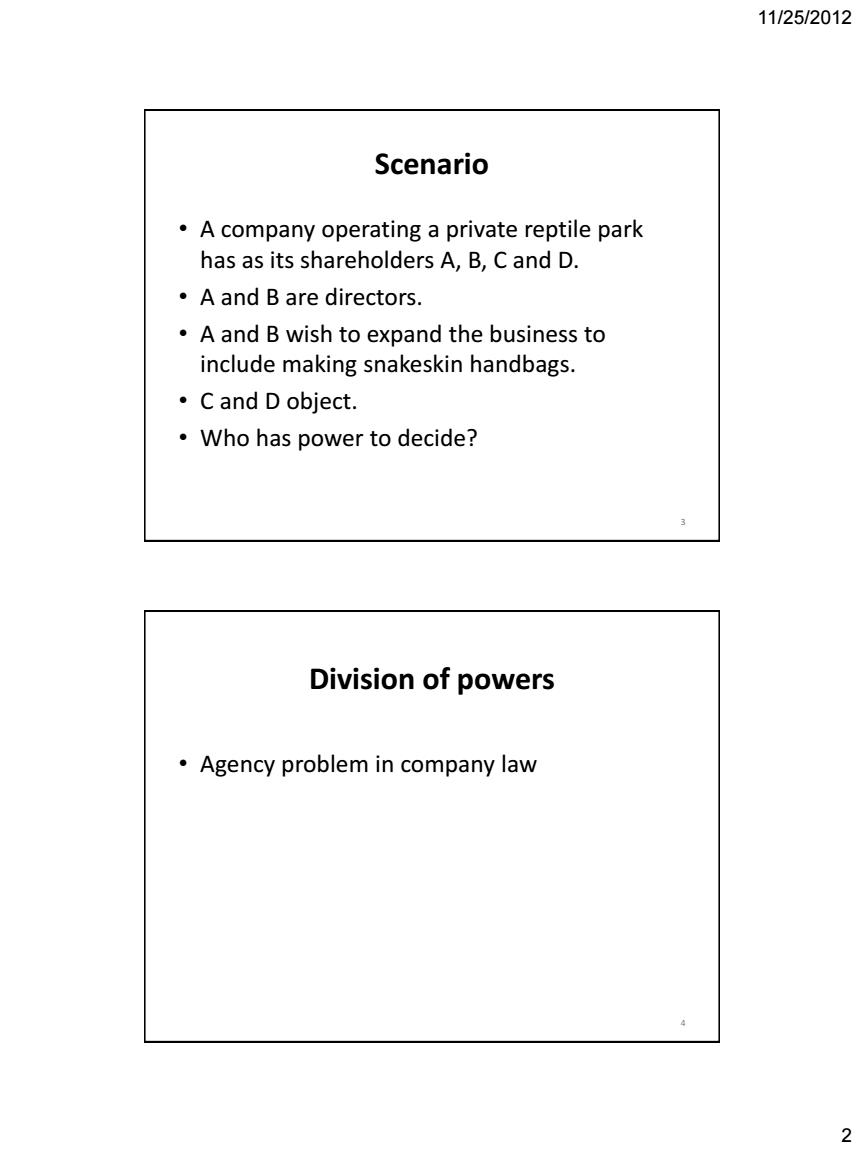
11/25/2012 Scenario A company operating a private reptile park has as its shareholders A,B,C and D. ·A and B are directors. A and B wish to expand the business to include making snakeskin handbags. ·C and D object.. Who has power to decide? Division of powers Agency problem in company law 2
11/25/2012 2 3 Scenario • A company operating a private reptile park has as its shareholders A, B, C and D. • A and B are directors. • A and B wish to expand the business to include making snakeskin handbags. • C and D object. • Who has power to decide? 4 Division of powers • Agency problem in company law

11/25/2012 Division of powers ·Decision rights Decision-making power o Instruction rights o Veto or approval rights >The size of the corporate action >The decision involves an investment type decision >The decision involves conflicts of interest Appointment and removal Shareholder v.director primacy Division of powers ·UK law(HK case law) .The originating power is held by members Members delegate power to the board based on articles Members can alter the initial distribution by altering the articles 3
11/25/2012 3 5 Division of powers • Decision rights Decision-making power o Instruction rights o Veto or approval rights The size of the corporate action The decision involves an investment type decision The decision involves conflicts of interest • Appointment and removal • Shareholder v. director primacy 6 Division of powers • UK law (HK case law) The originating power is held by members Members delegate power to the board based on articles Members can alter the initial distribution by altering the articles

11/25/2012 Division of powers ·US law(Delaware law The board's authority to manage co is provided by the Delaware General Corporation Law Default rule or mandatory rule?[rarely see amendments to this provision] Default position is set in favor of the board s/er approval right over the sale of assets which amount to "all or substantially all"of the assets s/er have no right to approve share issues and direct conflicts of interest [by board approval or court review] Board to appoint and delegate powers to executive directors .Obstacles to amending articles in order to re-distribute the board power:board resolution making a proposal majority s/ers vote Division of powers 。German law LLC Act and Stock Corporation Act .2 tiers of board:management board +supervisory board Management board may include members Supervisory board includes non-managerial members and outside directors(i.e.,union reps) Statutes [not s/ers]delegate powers to board .Statutes do not provide s/er approval right in relation to significant transactions Other decision rights for the s/er body:appointment of auditors, approval of payments to board members,measures relating to the raising of capital and issue of shares-more items can be added in articles but cannot invade the sphere of managerial authority given to the management board by the statutes 8 4
11/25/2012 4 7 Division of powers • US law (Delaware law) The board’s authority to manage co is provided by the Delaware General Corporation Law Default rule or mandatory rule? [rarely see amendments to this provision] Default position is set in favor of the board s/er approval right over the sale of assets which amount to “all or substantially all” of the assets s/er have no right to approve share issues and direct conflicts of interest [by board approval or court review] Board to appoint and delegate powers to executive directors Obstacles to amending articles in order to re-distribute the board power: board resolution making a proposal + majority s/ers vote 8 Division of powers • German law LLC Act and Stock Corporation Act 2 tiers of board: management board + supervisory board Management board may include members Supervisory board includes non-managerial members and outside directors (i.e., union reps) Statutes [not s/ers] delegate powers to board Statutes do not provide s/er approval right in relation to significant transactions Other decision rights for the s/er body: appointment of auditors, approval of payments to board members, measures relating to the raising of capital and issue of shares – more items can be added in articles but cannot invade the sphere of managerial authority given to the management board by the statutes
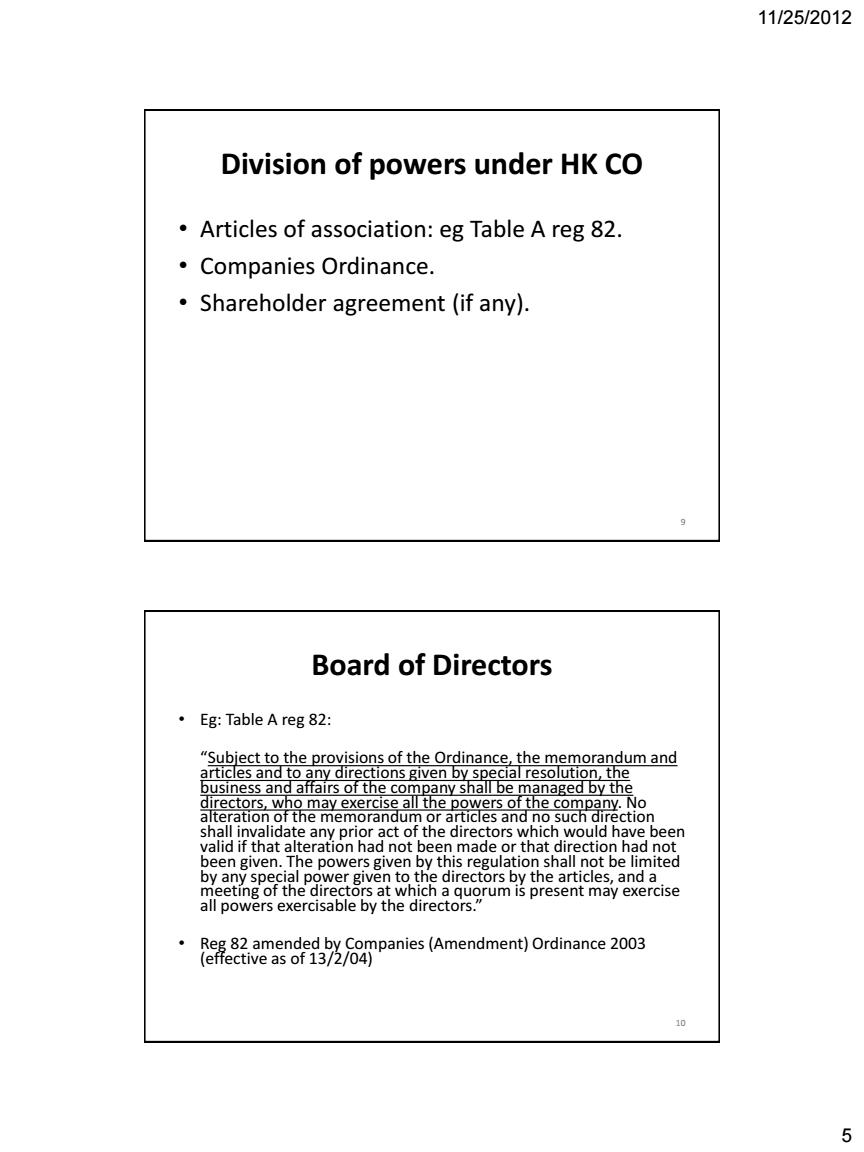
11/25/2012 Division of powers under HK CO Articles of association:eg Table A reg 82. Companies Ordinance. Shareholder agreement (if any) Board of Directors ·Eg:Table A reg82: "Subject to the provisions of the Ordinance,the memorandum and articles and to any directions given by special resolution,the business and affairs of the company shall be managed by the directors,who may exercise all the powers of the company.No alteration of the memorandum or articles and no such direction shall invalidate any prior act of the directors which would have been valid if that alteration had not been made or that direction had not been given.The powers given by this regulation shall not be limited by any special power given to the directors by the articles,and a meeting of the directors at which a quorum is present may exercise all powers exercisable by the directors." 。 Reg 82 amended by Companies(Amendment)Ordinance 2003 (effective as of 13/2/04) 10 6
11/25/2012 5 9 Division of powers under HK CO • Articles of association: eg Table A reg 82. • Companies Ordinance. • Shareholder agreement (if any). 10 Board of Directors • Eg: Table A reg 82: “Subject to the provisions of the Ordinance, the memorandum and articles and to any directions given by special resolution, the business and affairs of the company shall be managed by the directors, who may exercise all the powers of the company. No alteration of the memorandum or articles and no such direction shall invalidate any prior act of the directors which would have been valid if that alteration had not been made or that direction had not been given. The powers given by this regulation shall not be limited by any special power given to the directors by the articles, and a meeting of the directors at which a quorum is present may exercise all powers exercisable by the directors.” • Reg 82 amended by Companies (Amendment) Ordinance 2003 (effective as of 13/2/04)
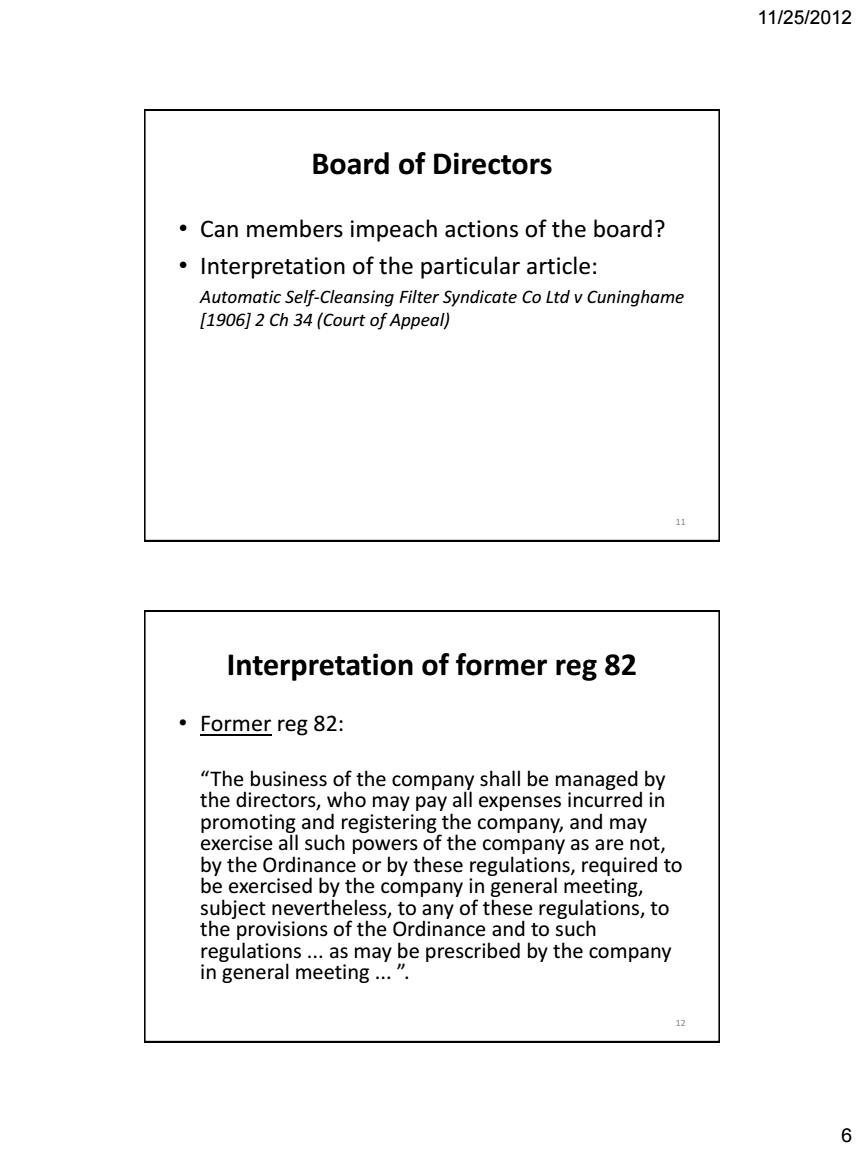
11/25/2012 Board of Directors Can members impeach actions of the board? Interpretation of the particular article: Automatic Self-Cleansing Filter Syndicate Co Ltd v Cuninghame [1906]2 Ch 34 (Court of Appeal) 11 Interpretation of former reg 82 ·Former reg82: "The business of the company shall be managed by the directors,who may pay all expenses incurred in promoting and registering the company,and may exercise all such powers of the company as are not, by the Ordinance or by these regulations,required to be exercised by the company in general meeting, subject nevertheless,to any of these regulations,to the provisions of the Ordinance and to such regulations...as may be prescribed by the company in general meeting…”. 6
11/25/2012 6 11 • Can members impeach actions of the board? • Interpretation of the particular article: Automatic Self-Cleansing Filter Syndicate Co Ltd v Cuninghame [1906] 2 Ch 34 (Court of Appeal) Board of Directors 12 Interpretation of former reg 82 • Former reg 82: “The business of the company shall be managed by the directors, who may pay all expenses incurred in promoting and registering the company, and may exercise all such powers of the company as are not, by the Ordinance or by these regulations, required to be exercised by the company in general meeting, subject nevertheless, to any of these regulations, to the provisions of the Ordinance and to such regulations ... as may be prescribed by the company in general meeting ...
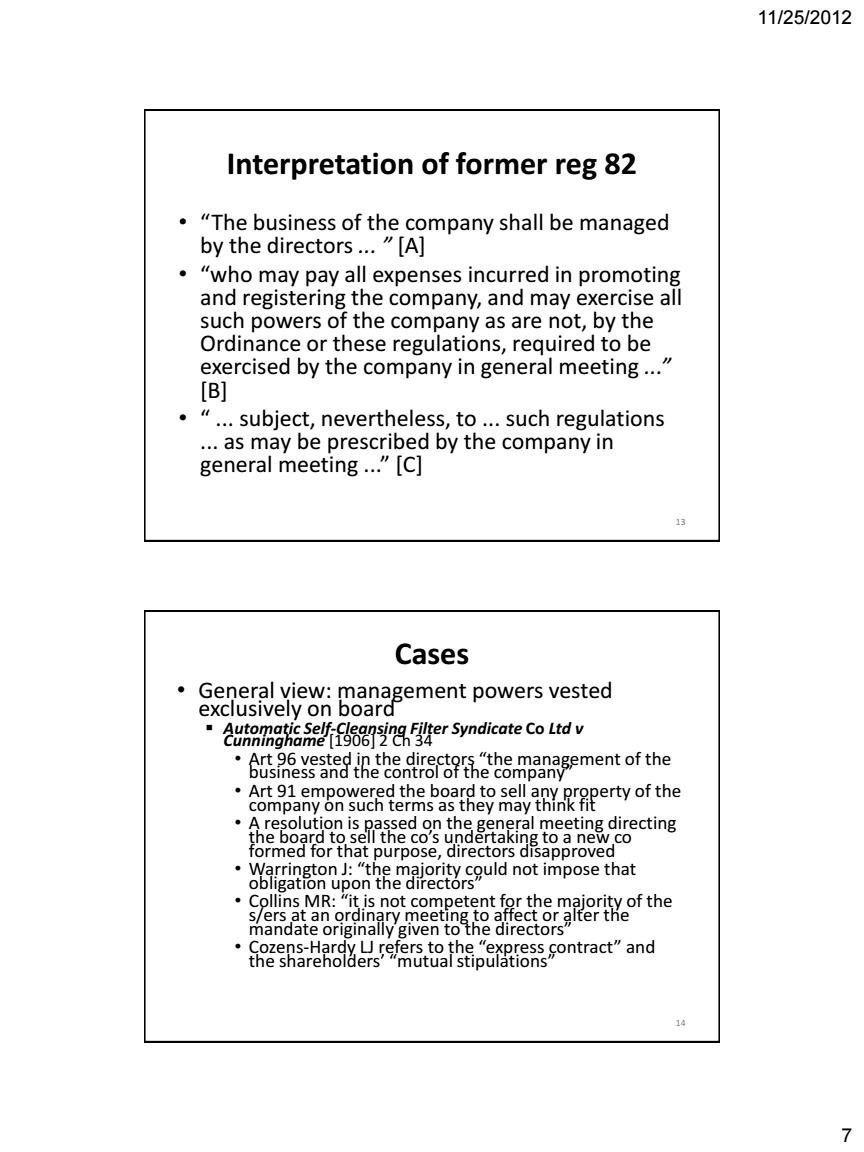
11/25/2012 Interpretation of former reg 82 "The business of the company shall be managed by the directors..."[A] "who may pay all expenses incurred in promoting and registering the company,and may exercise all such powers of the company as are not,by the Ordinance or these regulations,required to be exercised by the company in general meeting... [B] ."..subject,nevertheless,to...such regulations ..as may be prescribed by the company in general meeting..."[C] 13 Cases General view:management powers vested exclusively on board unmingnamer Syndicate Co Ltdv Art 96 vested in the directors "the management of the business and the control of the company Art 91 empowered the board to sell any property of the company on such terms as they may think fit A resolution is passed on the general meeting directing the board to sell the co's undertaking to a new co formed for that purpose,directors disapproved Warrington J:"the majority could not impose that obligation upon the directors' Collins MR:"it is not competent for the majority of the s/ers at an ordinary meeting to affect or alter the mandate originally given to the directors" ‘品e68erCt品983 ontract"and "mutual stipulations >
11/25/2012 7 13 Interpretation of former reg 82 • “The business of the company shall be managed by the directors ... ” [A] • “who may pay all expenses incurred in promoting and registering the company, and may exercise all such powers of the company as are not, by the Ordinance or these regulations, required to be exercised by the company in general meeting ...” [B] • “ ... subject, nevertheless, to ... such regulations ... as may be prescribed by the company in general meeting ...” *C+ 14 Cases • General view: management powers vested exclusively on board Automatic Self-Cleansing Filter Syndicate Co Ltd v Cunninghame [1906] 2 Ch 34 • Art 96 vested in the directors “the management of the business and the control of the company” • Art 91 empowered the board to sell any property of the company on such terms as they may think fit • A resolution is passed on the general meeting directing the board to sell the co’s undertaking to a new co formed for that purpose, directors disapproved • Warrington J: “the majority could not impose that obligation upon the directors” • Collins MR: “it is not competent for the majority of the s/ers at an ordinary meeting to affect or alter the mandate originally given to the directors” • Cozens-Hardy LJ refers to the “express contract” and the shareholders’ “mutual stipulations
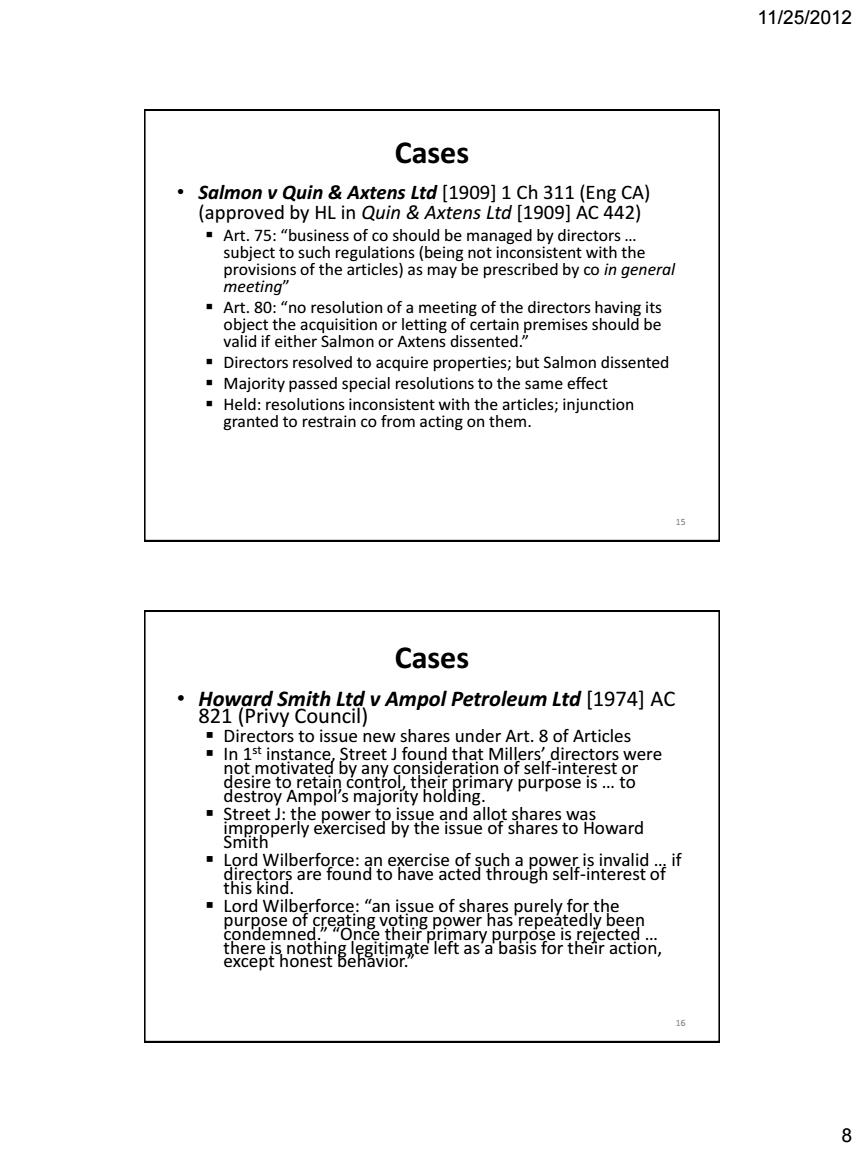
11/25/2012 Cases Salmon v Quin Axtens Ltd [1909]1 Ch 311 (Eng CA) (approved by HL in Quin Axtens Ltd [1909]AC 442) Art.75:"business of co should be managed by directors... subject to such regulations(being not inconsistent with the provisions of the articles)as may be prescribed by co in general meeting" Art.80:"no resolution of a meeting of the directors having its object the acquisition or letting of certain premises should be valid if either Salmon or Axtens dissented." Directors resolved to acquire properties;but Salmon dissented Majority passed special resolutions to the same effect Held:resolutions inconsistent with the articles;injunction granted to restrain co from acting on them. 15 Cases Howard Smith Ltd v Ampol Petroleum Ltd [1974]AC 821(Privy Council) Directors to issue new shares under Art.8 of Articles In 1st instance,Street J found that Millers'directors were not motivated by any consideration of self-interest or desire to retain control,their primary purpose is ..to destroy Ampol's majority holding. Street J:the power to issue and allot shares was improperly exercised by the issue of shares to Howard Smith Lord Wilberforce:an exercise of such a power is invalid. directors are found to have acted through self-interest of this kind. Lord Wilberforce:"an issue of shares purely for the purpose of creating voting power has repeatedly been condemned." "'Once their primary purpose is rejected... there is nothing legitimate left as a basis for their action, except honest behavior. 16 8
11/25/2012 8 15 Cases • Salmon v Quin & Axtens Ltd [1909] 1 Ch 311 (Eng CA) (approved by HL in Quin & Axtens Ltd [1909] AC 442) Art. 75: “business of co should be managed by directors … subject to such regulations (being not inconsistent with the provisions of the articles) as may be prescribed by co in general meeting” Art. 80: “no resolution of a meeting of the directors having its object the acquisition or letting of certain premises should be valid if either Salmon or Axtens dissented.” Directors resolved to acquire properties; but Salmon dissented Majority passed special resolutions to the same effect Held: resolutions inconsistent with the articles; injunction granted to restrain co from acting on them. 16 Cases • Howard Smith Ltd v Ampol Petroleum Ltd [1974] AC 821 (Privy Council) Directors to issue new shares under Art. 8 of Articles In 1st instance, Street J found that Millers’ directors were not motivated by any consideration of self-interest or desire to retain control, their primary purpose is … to destroy Ampol’s majority holding. Street J: the power to issue and allot shares was improperly exercised by the issue of shares to Howard Smith Lord Wilberforce: an exercise of such a power is invalid … if directors are found to have acted through self-interest of this kind. Lord Wilberforce: “an issue of shares purely for the purpose of creating voting power has repeatedly been condemned.” “Once their primary purpose is rejected … there is nothing legitimate left as a basis for their action, except honest behavior
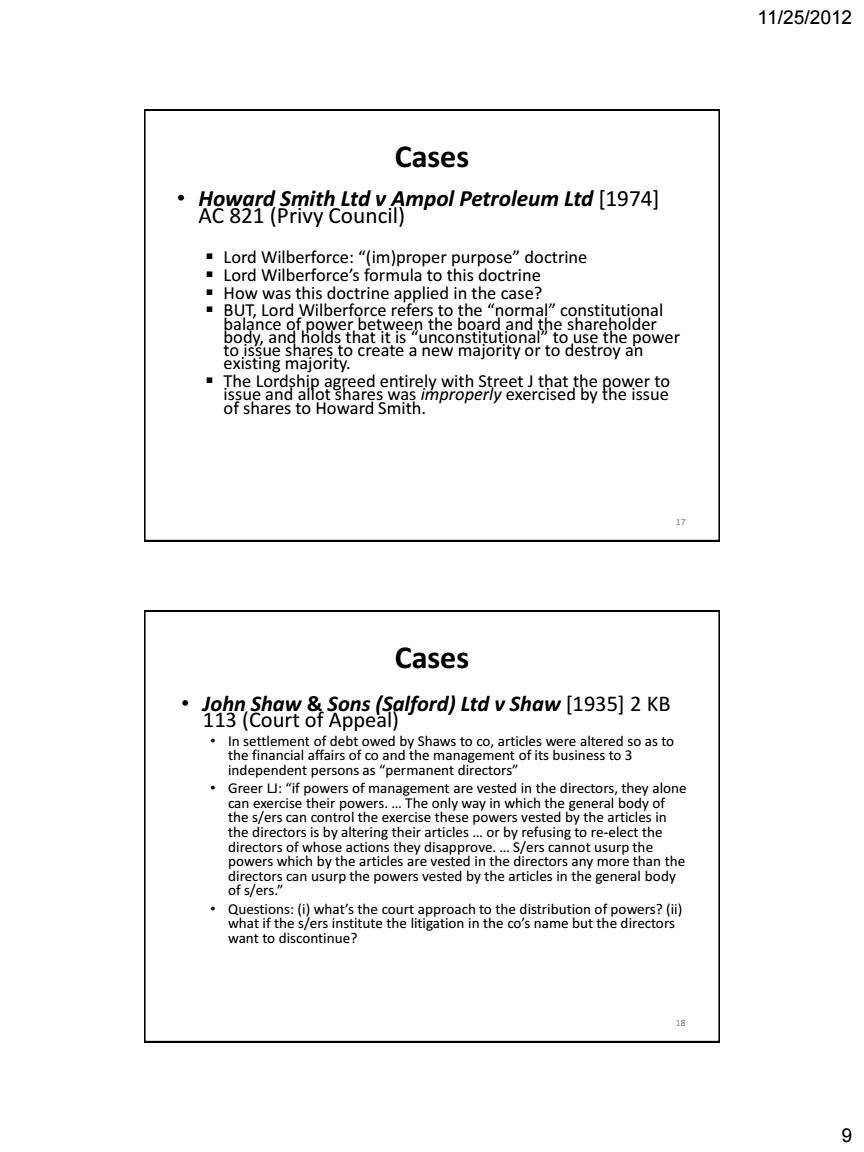
11/25/2012 Cases Howard Smith Ltd v Ampol Petroleum Ltd [1974] AC 821(Privy Council) Lord Wilberforce:"(im)proper purpose"doctrine Lord Wilberforce's formula to this doctrine How was this doctrine applied in the case? BUT,Lord Wilberforce refers to the "normal"constitutional balance of power,between the board and the shareholder body,and holds that it is "unconstitutional"to use the power to issue shares to create a new majority or to destroy an existing majority. The Lordship agreed entirely with Street J that the power to issue and allot shares was improperly exercised by the issue of shares to Howard Smith. 17 Cases John Shaw Sons (Salford)Ltd v Shaw [1935]2 KB 113(Court of Appeal) In settlement of debt owed by Shaws to co,articles were altered so as to the financial affairs of co and the management of its business to 3 independent persons as "permanent directors" Greer U:"if powers of management are vested in the directors,they alone can exercise their powers....The only way in which the general body of the s/ers can control the exercise these powers vested by the articles in the directors is by altering their articles...or by refusing to re-elect the directors of whose actions they disapprove....S/ers cannot usurp the powers which by the articles are vested in the directors any more than the directors can usurp the powers vested by the articles in the general body of s/ers." Questions:(i)what's the court approach to the distribution of powers?(ii) what if the s/ers institute the litigation in the co's name but the directors want to discontinue? 18 9
11/25/2012 9 17 Cases • Howard Smith Ltd v Ampol Petroleum Ltd [1974] AC 821 (Privy Council) Lord Wilberforce: “(im)proper purpose” doctrine Lord Wilberforce’s formula to this doctrine How was this doctrine applied in the case? BUT, Lord Wilberforce refers to the “normal” constitutional balance of power between the board and the shareholder body, and holds that it is “unconstitutional” to use the power to issue shares to create a new majority or to destroy an existing majority. The Lordship agreed entirely with Street J that the power to issue and allot shares was improperly exercised by the issue of shares to Howard Smith. 18 Cases • John Shaw & Sons (Salford) Ltd v Shaw [1935] 2 KB 113 (Court of Appeal) • In settlement of debt owed by Shaws to co, articles were altered so as to the financial affairs of co and the management of its business to 3 independent persons as “permanent directors” • Greer LJ: “if powers of management are vested in the directors, they alone can exercise their powers. … The only way in which the general body of the s/ers can control the exercise these powers vested by the articles in the directors is by altering their articles … or by refusing to re-elect the directors of whose actions they disapprove. … S/ers cannot usurp the powers which by the articles are vested in the directors any more than the directors can usurp the powers vested by the articles in the general body of s/ers.” • Questions: (i) what’s the court approach to the distribution of powers? (ii) what if the s/ers institute the litigation in the co’s name but the directors want to discontinue?

11/25/2012 Cases But cf Marshall's Valve Gear Co Ltd v Manning Wardle Co Ltd [1909]1 Ch 627 Neville J:"the majority of the shareholders in the company at a general meeting have a right to control the action of the directors,so long as they do not affect to control it in a direction contrary to any of the provisions of the articles which bind the co." 19 Cases Breckland Group Holdings Ltd v London Suffolk Properties Ltd [1989]BCLC 100 Article similar to the one in John Shaw Sons In the s/ers agt:"no decision on various matters including the institution of legal proceedings could be taken by the board without the affirmative support of two directors,each representing one of the majority s/ers" .The approach is in line with Automatic Self-Cleansing. Harman J:"the article confides the management of the business to the directors and in such a case it is not for the general meeting to interfere. Harman J:Marshall could not stand against the overwhelming weight of authority to the contrary 20 10
11/25/2012 10 19 Cases • But cf Marshall’s Valve Gear Co Ltd v Manning Wardle & Co Ltd [1909] 1 Ch 627 Neville J: “the majority of the shareholders in the company at a general meeting have a right to control the action of the directors, so long as they do not affect to control it in a direction contrary to any of the provisions of the articles which bind the co.” 20 Cases • Breckland Group Holdings Ltd v London & Suffolk Properties Ltd [1989] BCLC 100 Article similar to the one in John Shaw & Sons In the s/ers agt: “no decision on various matters including the institution of legal proceedings could be taken by the board without the affirmative support of two directors, each representing one of the majority s/ers” The approach is in line with Automatic Self-Cleansing. Harman J: “the article confides the management of the business to the directors and in such a case it is not for the general meeting to interfere.” Harman J: Marshall could not stand against the overwhelming weight of authority to the contrary